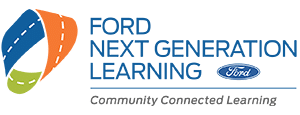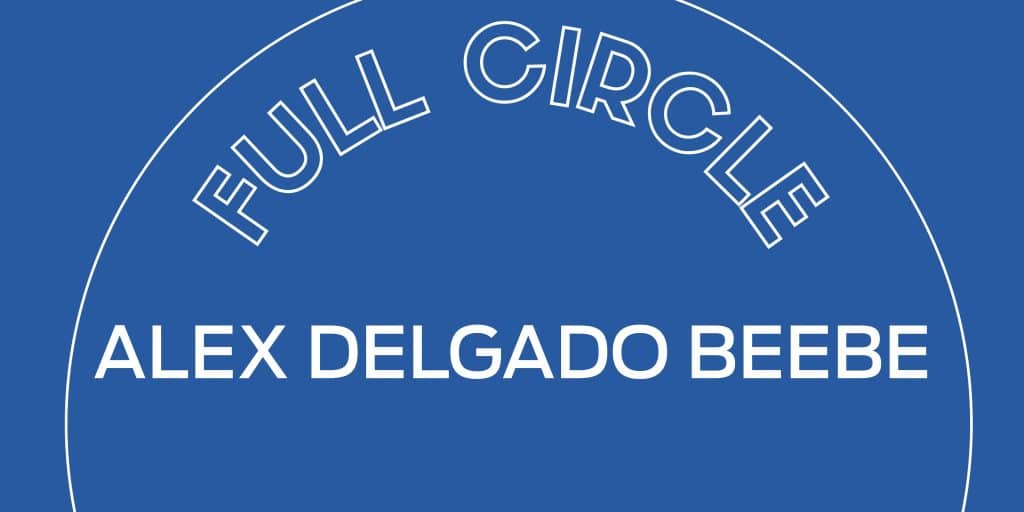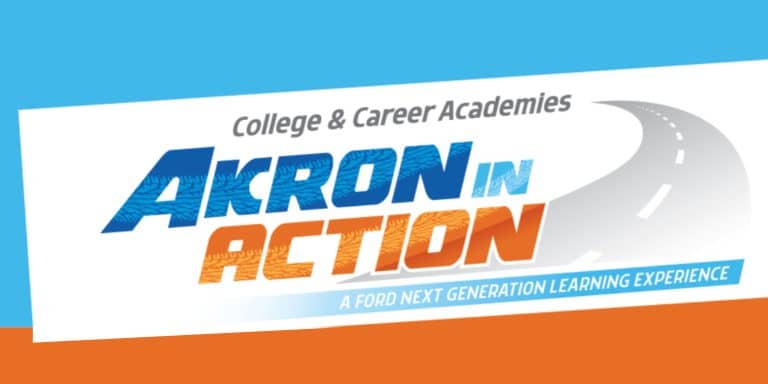Engineer Helps Connect Student Learning to Real-World Opportunity
For many students, the journey from high school into adulthood and career is uncertain. They face a landscape filled with options, but often lack the meaningful career support and direction needed to find their way. Traditional education often fails to bridge the gap between academic learning and the real world, but for students served by the Ford Next Generation Learning Network of communities, that journey is shaped by a transformative approach. It’s an approach that fills that gap and prepares each student for a future defined by their own interests, vision, and potential — a future aligned with regional and national workforce needs.
As part of our Full Circle series, this article highlights one such student, Alex Delgado Beebe. His path took him from Jeffersontown High School in Louisville, Kentucky; to J.B. Speed School of Engineering at the University of Louisville; to an out of town rotational leadership program with Schneider Electric; back home to Louisville as a Senior Sustainability Specialist for GE Appliances; and recently, to the position of Project Development Engineer with CMTA. It is truly an amazing record of advancement and achievement! It is also a powerful example of how a transformative, community-connected approach to secondary education can prepare young people for success in college, career, and life.
Alex’s career journey actually began at a very young age. As a boy, he was always driven by curiosity. Whether it was the mechanics of how things worked or the energy systems that powered them, he sought to understand it all. This drive took root during his time at Jeffersontown High School, where he enrolled in the school’s engineering academy. Through hands-on learning, collaborative projects, and exposure to real-world challenges, Alex discovered a true passion for engineering and a deep appreciation for how education could be the gateway to real career opportunities. The tight-knit environment provided by the academy wasn’t just about friendships. It was also about creating a culture of collaboration, accountability, ambition, and building professional relationships. Projects weren’t simply assignments. They were opportunities to shape custom solutions, work as part of a problem-solving team, and build a true sense of pride and accomplishment through meaningful work. According to Alex,“The cohort style allowed me to spend most of my day with classmates of similar interests. We were close, and the projects felt like something we could be proud of.”
In the classroom, Alex developed strong leadership skills, and honing those skills went beyond the school walls. He was selected to serve as a Ford NGL Ambassador and represent his school and community at a Ford NGL National Conference in California. Speaking at the national event to educators and business leaders, Alex shared his story of how real-world learning was benefiting him and his peers. His role as an ambassador reflected not only his achievements but his ability to articulate the impact that community-connected, career-focused learning had on his life.
The Ford NGL approach to the career-academy model, which Alex described, focuses on more than acquiring academic knowledge. It emphasizes collaboration, real-world applications, and creating pathways for students to succeed in a career and life as defined by them. Says Alex,“Several of us went on to receive engineering degrees (mine in civil and environmental engineering), and I feel the academy model contributed to that. The academy also helped me develop not only the technical skills I carried into my college courses, but also project and social skills I’ve carried into my work today.”
Alex credits many people for helping to make his college and career achievements possible. Among those is Tami Hatfield, who was a member of the Academies of Louisville guiding team (steering committee) and also a business partner representative for his academy at Jeffersontown. “Tami Hatfield, formerly with Ford and now at GE Appliances, has been my longest and most active professional connection. She has an impressive career of her own and is always quick to support others in advancing theirs. At Jeffersontown High, several teachers also made a significant impact on my journey — Mary McLeod Lineberry and Melissa Payne, to name two. They cared deeply about my future education, often more than I did at the time.”
Talk about coming full circle — Alex reflected on his journey after college,“I relocated several times as part of a rotational leadership program with Schneider Electric. Eventually, I joined a team that brought me back to Louisville. The city’s activities and people, my family, the sports teams, all make Louisville feel like home. If possible, spending time living outside of your hometown early in your career is a great way to develop character and for many, myself included, appreciate your hometown even more. A sense of community is something you can’t buy, it’s built through activity, service, and meaningful connections with the people around you.”
Alex is not just continuing to live out his dreams, he is paying it forward and helping to inspire the next generation of engineers. Since returning to Louisville, he’s gotten involved with ACE at Jeffersontown High School. The ACE Mentor Program of America provides guidance and mentorship to high school students interested in pursuing careers in architecture, construction, and engineering. In that effort, he works alongside Matt Nett and Jason Stepp both of whom Alex describes as his mentors and great role models for education and service.
“Many students at Jeffersontown High School are interested in engineering, and I want to help them see the possibilities in front of them. Helping students understand that they don’t have to go it alone and that there are people willing to guide them makes all the difference. It’s not just about technical skills. It’s about mindset, confidence, and knowing that they can reach their goals,” Alex says. Through ACE, Alex is not just a mentor. Alex is a living example of what is possible when education meets opportunity. “Helping them (students) see the light at the end of the tunnel can be a motivation to push through those challenging years. It’s about showing them that their hard work will pay off.” I tell them, “If you’re interested in energy or sustainability engineering, I recommend pursuing a degree in mechanical, electrical, or chemical engineering (ironic, given my civil engineering degree). From there, look for a co-op or early career opportunities with an HVAC or electrical design company. Seek out experience in public speaking, client and project management. As a sustainability professional, you’re often your own salesperson, manager, and promoter of the projects in front of you.”
Alex’s story is just one example of how the Ford NGL approach to career academies is far more than another short-lived program or temporary experience. To the contrary, it sets students on a lifelong path of opportunity, leadership, and community engagement. The design of the Ford NGL Roadmap ensures that the educational experience uniquely nurtures each student’s talents and interests and taps into their full potential, preparing them for a career path of choice. Across the country, more and more districts are recognizing what Alex’s community realized early on. Students like Alex thrive when education connects learning to real-world careers. A recent Hechinger Report article highlights this growing movement — a movement that puts students into the driver’s seat for career and personal success. To access the referenced Hechinger article click here. To learn more about Ford NGL and the Ford NGL Roadmap please click here.







